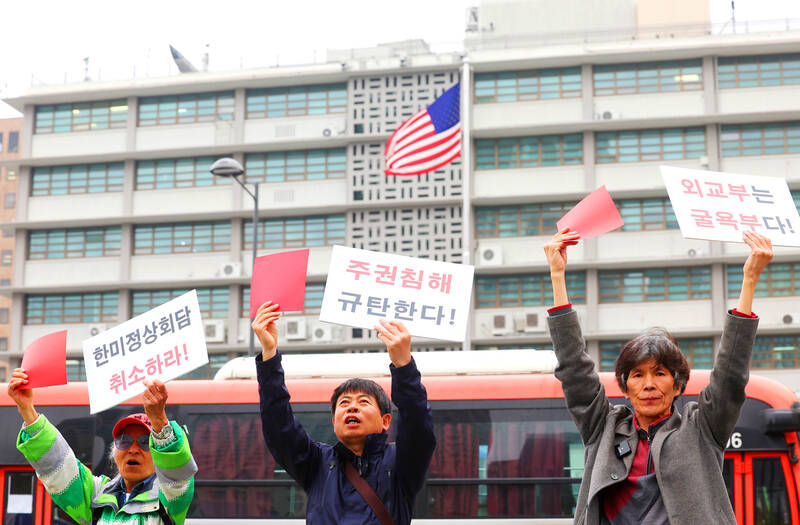South Korea yesterday said that a “significant portion” of leaked US intelligence documents indicating concerns in Seoul about arms supplies to Ukraine were fake.
The documents are part of a broader leak the Pentagon has described as a “very serious” national security risk. It has also created a diplomatic headache for Washington as they appear to show US spying on close allies, including South Korea and Israel.
Some files reportedly show concern among top South Korean national security officials that arms and ammunition manufactured by their country might end up being used in Ukraine — a violation of Seoul’s policy of not selling weapons to nations at war.

Photo: EPA-EFE
In a call yesterday, the South Korean minister of national defense and the US secretary of defense agreed that “a significant number of the documents in question were fabricated,” the presidential office in Seoul said in a statement.
Dozens of photographs of the documents have been circulating on social media platforms and messaging services, including Twitter, Telegram and Discord, for at least weeks.
The Pentagon has said it is working to determine if the documents are genuine, and that at least one appeared to have been manipulated. However, US officials reportedly believe many of the documents are real.
The leak has prompted US officials to reassure allies such as South Korea, which has provided non-lethal and humanitarian aid to Ukraine since Russia invaded last year. However, Seoul has a long-standing policy against providing weapons to countries in active conflict, which it says makes it difficult to supply arms directly to Ukraine.
The revelation of the purported Ukraine discussions among top national security officials has sparked criticism in South Korea about the vulnerability of sensitive sites, including the presidential office.
South Korean President Yoon Suk-yeol’s office pushed back yesterday, saying it had “iron-clad security” and that allegations of eavesdropping were “senseless lies.”
Yoon is scheduled to travel to the US later this month on a state visit.

‘UNUSUAL EVENT’: The Australian defense minister said that the Chinese navy task group was entitled to be where it was, but Australia would be watching it closely The Australian and New Zealand militaries were monitoring three Chinese warships moving unusually far south along Australia’s east coast on an unknown mission, officials said yesterday. The Australian government a week ago said that the warships had traveled through Southeast Asia and the Coral Sea, and were approaching northeast Australia. Australian Minister for Defence Richard Marles yesterday said that the Chinese ships — the Hengyang naval frigate, the Zunyi cruiser and the Weishanhu replenishment vessel — were “off the east coast of Australia.” Defense officials did not respond to a request for comment on a Financial Times report that the task group from

Asian perspectives of the US have shifted from a country once perceived as a force of “moral legitimacy” to something akin to “a landlord seeking rent,” Singaporean Minister for Defence Ng Eng Hen (黃永宏) said on the sidelines of an international security meeting. Ng said in a round-table discussion at the Munich Security Conference in Germany that assumptions undertaken in the years after the end of World War II have fundamentally changed. One example is that from the time of former US president John F. Kennedy’s inaugural address more than 60 years ago, the image of the US was of a country

BLIND COST CUTTING: A DOGE push to lay off 2,000 energy department workers resulted in hundreds of staff at a nuclear security agency being fired — then ‘unfired’ US President Donald Trump’s administration has halted the firings of hundreds of federal employees who were tasked with working on the nation’s nuclear weapons programs, in an about-face that has left workers confused and experts cautioning that the Department of Government Efficiency’s (DOGE’s) blind cost cutting would put communities at risk. Three US officials who spoke to The Associated Press said up to 350 employees at the National Nuclear Security Administration (NNSA) were abruptly laid off late on Thursday, with some losing access to e-mail before they’d learned they were fired, only to try to enter their offices on Friday morning

CONFIDENT ON DEAL: ‘Ukraine wants a seat at the table, but wouldn’t the people of Ukraine have a say? It’s been a long time since an election, the US president said US President Donald Trump on Tuesday criticized Ukrainian President Volodymyr Zelenskiy and added that he was more confident of a deal to end the war after US-Russia talks. Trump increased pressure on Zelenskiy to hold elections and chided him for complaining about being frozen out of talks in Saudi Arabia. The US president also suggested that he could meet Russian President Vladimir Putin before the end of the month as Washington overhauls its stance toward Russia. “I’m very disappointed, I hear that they’re upset about not having a seat,” Trump told reporters at his Mar-a-Lago resort in Florida when asked about the Ukrainian